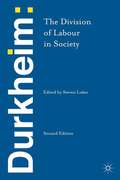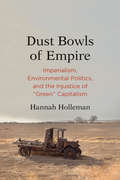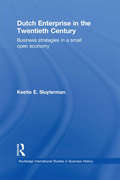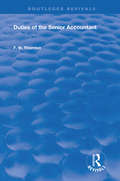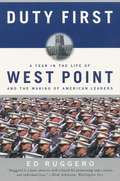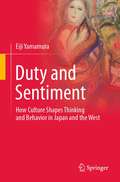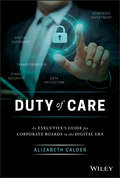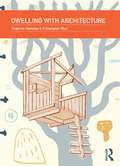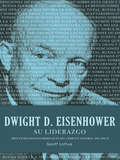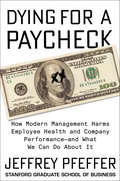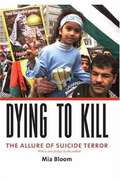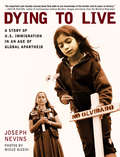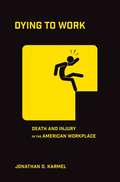- Table View
- List View
Durkheim and the Birth of Economic Sociology
by Philippe SteinerAn illuminating account of the development of Durkheim's economic sociologyÉmile Durkheim's work has traditionally been viewed as a part of sociology removed from economics. Rectifying this perception, Durkheim and the Birth of Economic Sociology is the first book to provide an in-depth look at the contributions made to economic sociology by Durkheim and his followers. Philippe Steiner demonstrates the relevance of economic factors to sociology and shows how the Durkheimians inform today's economic systems.Steiner argues that there are two stages in Durkheim's approach to the economy—a sociological critique of political economy and a sociology of economic knowledge. In his early works, Durkheim critiques economists and their categories, and tries to analyze the division of labor from a social rather than economic perspective. From the mid-1890s onward, Durkheim's preoccupations shifted to questions of religion and the sociology of knowledge. Durkheim's disciples, such as Maurice Halbwachs and François Simiand, synthesized and elaborated on Durkheim's first-stage arguments, while his ideas on religion and the economy were taken up by Marcel Mauss. Steiner indicates that the ways in which the Durkheimians rooted the sociology of economic knowledge in the educational system allows for an invaluable perspective on the role of economics in modern society, similar to the perspective offered by Max Weber's work.Recognizing the power of the Durkheimian approach, Durkheim and the Birth of Economic Sociology assesses the effect of this important thinker and his successors on one of the most active fields in contemporary sociology.
Durkheim: The Division of Labour in Society
by Steven Emile Durkheim LukesRevised for the first time in over thirty years, this edition of Emile Durkheim’s masterful work on the nature and scope of sociology is updated with a new introduction and improved translation by leading scholar Steven Lukes that puts Durkheim’s work into context for the twenty-first century reader. When it was originally published, The Division of Labor in Society was an entirely original work on the nature of labor and production as they were being shaped by the industrial revolution. Emile Durkheim’s seminal work studies the nature of social solidarity and explores the ties that bind one person to the next in order to hold society together. This revised and updated second edition fluently conveys Durkheim’s arguments for contemporary readers. Leading Durkheim scholar Steve Lukes’s new introduction builds upon Lewis Coser’s original—which places the work in its intellectual and historical context and pinpoints its central ideas and arguments. Lukes explains the text’s continued significance as a tool to think about and deal with problems that face us today. The original translation has been revised and reworked in order to make Durkheim’s arguments clearer and easier to read. The Division of Labor in Society is an essential resource for students and scholars hoping to deepen their understanding of one of the pioneering voices in modern sociology and twentieth-century social thought.
Dust Bowls of Empire: Imperialism, Environmental Politics, and the Injustice of "Green" Capitalism (Yale Agrarian Studies Series)
by Hannah HollemanA profound reinterpretation of both the Dust Bowl on the U.S. southern plains and its relevance for today The 1930s witnessed a harrowing social and ecological disaster, defined by the severe nexus of drought, erosion, and economic depression that ravaged the U.S. southern plains. Known as the Dust Bowl, this crisis has become a major referent of the climate change era, and has long served as a warning of the dire consequences of unchecked environmental despoliation. Through innovative research and a fresh theoretical lens, Hannah Holleman reexamines the global socioecological and economic forces of settler colonialism and imperialism precipitating this disaster, explaining critical antecedents to the acceleration of ecological degradation in our time. Holleman draws lessons from this period that point a way forward for environmental politics as we confront the growing global crises of climate change, freshwater scarcity, extreme energy, and soil degradation.
Dust To Eat: Drought and Depression in the 1930s
by Michael L. CooperA history of the Dust Bowl years, including interviews and letters.
Dust and Dignity: Domestic Employment in Contemporary Ecuador
by Erynn Masi CasanovaWhat makes domestic work a bad job, even after efforts to formalize and improve working conditions? Erynn Masi de Casanova's case study, based partly on collaborative research conducted with Ecuador's pioneer domestic workers' organization, examines three reasons for persistent exploitation. First, the tasks of social reproduction are devalued. Second, informal work arrangements escape regulation. And third, unequal class relations are built into this type of employment. Accessible to advocates and policymakers as well as academics, this book provides both theoretical discussions about domestic work and concrete ideas for improving women's lives.Drawing on workers' stories of lucha, trabajo, and sacrificio—struggle, work, and sacrifice—Dust and Dignity offers a new take on an old occupation. From the intimate experience of being a body out of place in an employer's home, to the common work histories of Ecuadorian women in different cities, to the possibilities for radical collective action at the national level, Casanova shows how and why women do this stigmatized and precarious work and how they resist exploitation in the search for dignified employment. From these searing stories of workers' lives, Dust and Dignity identifies patterns in domestic workers' experiences that will be helpful in understanding the situation of workers elsewhere and offers possible solutions for promoting and ensuring workers' rights that have relevance far beyond Ecuador.
Dutch Bros Coffee: Leadership Selection
by Jasmijn Bol Tatiana Sandino Robert Grasser Serena LoftusCase
Dutch Bros. Coffee: A Compelling Future
by Joshua D. Margolis Christine SnivelyTravis Boersma, co-founder and President of the Dutch Bros. coffee chain, faces three operational decisions that will shape the company's growth trajectory and distinctive culture. First, should they offer a specialty coffee at a subset of their stores in one region where customers are clamoring for it, contrary to the company's commitment to a consistent experience across all stores? Second, as the company continues to expand, should they roll out an electronic point-of-sale system, which has interfered with customer service in prior pilot tests? Third, how can Dutch Bros. provide opportunities for their best employees, who aspire to own and operate their own franchise stores but often lack the expertise and funding to do so.
Dutch Enterprise in the 20th Century: Business Strategies in Small Open Country (Routledge International Studies in Business History)
by Keetie E. SluytermanThis is the first book to summarise the twentieth century economic history of the Netherlands from a business history perspective. It has a broad historical coverage of Dutch business development including in particular the major multinationals such as Philips, Shell, and Unilever. Although focused on Dutch business it has a strong international flavour.
Duties of the Senior Accountant (Routledge Revivals)
by F.W. ThorntonFirst published in 1932, this volume echoed the success of Duties of the Junior Accountant and was similarly long-awaited as a textbook for the industry and aimed to instruct junior accountants in the work of their senior colleagues and future selves. Senior accountants are those who may conduct an examination independently except for a final review by a managing accountant, principal or partner. Seniors may have charge of work needing perhaps one, ten, or even more assistants or of a section of a larger examination conducted under the supervision of an accountant of higher rating. The chapters in this volume detail issues including beginning an examination, audits of banks, reviews by a principal accountant and arranging work and staff.
Duty First
by Ed RuggeroDuty First is a penetrating account of a year inside one of America's premier schools for leadership -- the United States Military Academy -- as it celebrates the bicentennial of its founding. Ed Ruggero, a former West Point cadet and professor, takes an incisive look at how this elite school builds the "leaders of character" who will command the nation's military. Writing with deep insight and superb narrative skill, Ruggero follows the cadet's tumultuous lives: the initial grueling training; the strict student hierarchy and intense classroom work; and the interaction between the lowly first-year plebes and the upper-class cadets who train them. Duty First also shows the role played by the majors, captains, and sergeants, who oversee everything that happens at this unique institution.
Duty and Sentiment: How Culture Shapes Thinking and Behavior in Japan and the West
by Eiji YamamuraThis book is an exploration that shows us how sentiment and duty form the core of Japanese culture. It looks at how the combination of common sense, culture, and social norms influence people’s ways of thinking and behavior. Although the focus is Japan in looking at these interrelationships, the author draws on his experience and knowledge of other countries from his days before graduate school, when he traveled the world as a backpacker. Now, from the world of academia, he uses his knowledge of economic analysis to consider the similarities and differences in human behavior among countries and cultures. The wide-ranging scope of the book takes in marital life, education, sports, business, and culture in modern Japanese society. Why, for instance, does linguistic heterogeneity generally have negative effects on FIFA rankings of national soccer teams, and what does this have to do with the difficulty of technology transfer among businesses in multilingual countries? Why was the demand for the film Bohemian Rhapsody, about the British rock group Queen, so high in Japan? How do Kazuo Ishiguro’s novels resemble scenarios related to Japan’s long-term public finance prospects? How does the depiction of contemporary life compared with “the old days” in the films of Yasujiro Ozu provide a cautionary tale for aging societies today? How are older people with grandchildren more likely to accept tax increases to support future generations? And how is the Japanese government actively drawing on behavioral economics to appeal to public sentiment to contain the spread of COVID-19. These and a multitude of other questions are tackled by the backpacker who entered academia to become an economist and who now goes on a journey to find the answers. Readers can take the trip with him under his expert guidance, as he artfully combines sentiment, duty, and economic analysis.
Duty of Care: An Executive's Guide for Corporate Boards in the Digital Era
by Alizabeth CalderAn essential guide for board members and executives who need to understand the impact of digital on their thinking and decision making Duty of Care: An Executive's Guide for Corporate Boards in the Digital Era offers a much needed guide for board directors and leaders who need to get up-to-speed and close their digital knowledge gap in order to make the right decisions about digital technology investment and deployments. Written in easy-to-read language, this book targets directors and executives who want to protect themselves from risks ranging from massive cyber security breaches to digital infrastructure investment mistakes. Most board members don’t have the information they need to understand digital information systems, modern high-speed networks, and rapidly evolving software and hardware ecosystems. They also don’t have the time to seek out or filter what they need from the many diverse sources. Their lack of knowledge can lead to disastrous decisions that can cost shareholders billions of dollars in lost income or risk liability. Written by a globally recognized experienced business executive and expert in cyber security, this essential guide and blueprint can serve the strategic and governance needs of every company. Written by an noted expert in cyber security and digital strategy Designed to be accessible for board members unfamiliar with digital technology, with case studies and smart questions to support leaders on every topic Helps board directors, corporate officers, and corporate investors with the digital knowledge needed to make informed decisions Duty of Care is a comprehensive yet accessible book that helps board members close their “digital knowledge gap” in order to better serve their corporations.
Dwayne 'The Rock' Johnson
by Anita ElberseIn June 2016, Dwayne 'The Rock' Johnson is planning for the upcoming launch of an endeavor that is a first for a Hollywood actor with superstar status-a digital channel. The channel (named "Seven Bucks Digital Studios") will be a new part of film and television production company Seven Bucks Productions, which Johnson co-owns with his business partner and former wife, Dany Garcia. Under Garcia's guidance, Johnson has made a successful transition from being a top wrestler with World Wrestling Entertainment to also climbing the ranks in Hollywood, becoming one of its most bankable and highest-paid actors. The two stand out for pursuing an ambitious slate of projects as producers as well, making Seven Bucks Productions a force to be reckoned with in the world of entertainment. Are Johnson and Garcia right to bet on a new digital channel, which is scheduled to make its debut on YouTube in the next month, and do they have the best approach to making that channel a success?
Dwelling with Architecture
by Roderick Kemsley Christopher PlattThe dwelling is the most fundamental building type, nowhere more so than in the open landscape. This book can be read in a number of ways. It is first a book about houses and particularly the theme ‘dwelling and the land’. It examines the poetic and prosaic issues inherent in claiming a piece of the landscape to live on. It could also be seen as a kind of road map, full of both warnings and encouragements for all those involved with, or just interested in, the making of houses. That the domestic realm and the landscape can be vehicles for significant architectural insights is hardly an original observation. However this book seeks to bring the two topics together in a unique way. In exploring a building type that lies on the cusp of what is commonly understood as ‘building’ and ‘architecture’, it asks fundamental questions about what the very nature of architecture is. Who indeed is the architect and what is their role in the process of creating meaningful buildings?
Dwight D. Eisenhower su liderazgo
by Geoff LoftusLos métodos de liderazgo de Dwight Eisenhower durante el proyecto más intimidante de la historia, la invasión del Día D, proveen estrategias invaluables para el empresario de hoy.Ningún gerente general moderno ha conducido tal organización --las inmensas Fuerzas Armadas Aliadas de Estados Unidos, Gran Bretaña y Canadá--, ante tanta presión de tener que alcanzar el éxito. Comienza con él presentándose para trabajar como el gerente general del Día D Inc., teniendo que crear a un cuerpo directivo y compañía, y manejando las invasiones de África y Sicilia. Analizando operativos militares como operaciones comerciales y al general en jefe como gerente general. Proporciona lecciones de gerencia tales como:Conducir la junta directiva: FDR, Churchill y los jefes del Estado Mayor ConjuntoCrear la compañía: Convirtiendo a las Fuerzas Armadas Aliadas en una sola fuerza que pudiera cumplir con su misiónComprender la competencia y el mercado: Hitler y la Europa ocupada.
Dwight D. Eisenhower: Changing the World
by Robert L. Simons Shirley SunThis case describes the rise of Dwight (Ike) Eisenhower from a small town in Kansas to the pinnacle of power on the world stage. During his life, Eisenhower was leader of the Allied Forces in World War II, president of Columbia University, head of NATO, and president of the United States for two terms. Students will learn how he navigated life's choices to leave a lasting impact on the world.
Dwight D. Eisenhower: Changing the World
by Robert Simons Shirley SunThis case describes the rise of Dwight (Ike) Eisenhower from a small town in Kansas to the pinnacle of power on the world stage. During his life, Eisenhower was leader of the Allied Forces in World War II, president of Columbia University, head of NATO, and president of the United States for two terms. Students will learn how he navigated life's choices to leave a lasting impact on the world.
Dwyane Wade
by Jennifer Schoppe Anita ElberseIn July 2016, while on his annual China tour to help promote the sportswear brand Li-Ning, basketball superstar Dwyane Wade and his long-time business manager Lisa Joseph-Metelus face a decision regarding one of his other business partnerships-that with the American company Stance, known for its colorful socks. Involved with the young company since 2013, Wade quickly established himself as Stance's most successful brand ambassador. But recently, several younger players had also come on board as endorsers, and Stance had entered into an overall sponsorship deal with the NBA. With his Stance deal coming up for renewal in October 2016, what kind of deal should Wade and Joseph-Metelus propose to Stance? And how would a newly structured partnership fit into Wade's overall business portfolio-including his plans for after his active basketball career?
Dying for a Paycheck: How Modern Management Harms Employee Health and Company Performance -- and What We Can Do About It
by Jeffrey PfefferIn one survey, 61 percent of employees said that workplace stress had made them sick and 7 percent said they had actually been hospitalized. Job stress costs US employers more than $300 billion annually and may cause 120,000 excess deaths each year. In China, 1 million people a year may be dying from overwork. People are literally dying for a paycheck. And it needs to stop.In this timely, provocative book, Jeffrey Pfeffer contends that many modern management commonalities such as long work hours, work-family conflict, and economic insecurity are toxic to employees—hurting engagement, increasing turnover, and destroying people’s physical and emotional health—and also inimical to company performance. He argues that human sustainability should be as important as environmental stewardship. <P><P>You don’t have to do a physically dangerous job to confront a health-destroying, possibly life-threatening, workplace. Just ask the manager in a senior finance role whose immense workload, once handled by several employees, required frequent all-nighters—leading to alcohol and drug addiction. Or the dedicated news media producer whose commitment to getting the story resulted in a sixty-pound weight gain thanks to having no down time to eat properly or exercise. Or the marketing professional prescribed antidepressants a week after joining her employer.In Dying for a Paycheck, Jeffrey Pfeffer marshals a vast trove of evidence and numerous examples from all over the world to expose the infuriating truth about modern work life: even as organizations allow management practices that literally sicken and kill their employees, those policies do not enhance productivity or the bottom line, thereby creating a lose-lose situation.Exploring a range of important topics including layoffs, health insurance, work-family conflict, work hours, job autonomy, and why people remain in toxic environments, Pfeffer offers guidance and practical solutions all of us—employees, employers, and the government—can use to enhance workplace wellbeing. We must wake up to the dangers and enormous costs of today’s workplace, Pfeffer argues. Dying for a Paycheck is a clarion call for a social movement focused on human sustainability. Pfeffer makes clear that the environment we work in is just as important as the one we live in, and with this urgent book, he opens our eyes and shows how we can make our workplaces healthier and better.
Dying of Money: Lessons of the Great German and American Inflations
by Jens O. ParssonThe twentieth century brought the institution of inflation to its ultimate perfection. When economic systems are so highly organized as they became in the twentieth century, so that people are completely dependent on money trading for the necessaries of life, there is no place to take shelter from inflation. Inflations in the twentieth century became like inflations in no other century. The two principal inflations that occurred in advanced industrial nations in the twentieth century will probably prove to have done more to influence the course of history itself than any other inflation. One of these was the German inflation that had its roots in World War I, grew to a giddy height and a precipitous fall in 1923, and contributed to the rise of Adolf Hitler and World War II. The other was the great American inflation that had its roots in World War II, grew in the decade of the 1960's toward an almost equally giddy height, and contributed to results which could not even be imagined at the time this book was written.
Dying to Kill: The Allure of Suicide Terror
by Mia BloomWhat motivates suicide bombers in Iraq and around the world? Can winning the hearts and minds of local populations stop them? Will the phenomenon spread to the United States? These vital questions are at the heart of this important book. Mia Bloom examines the use, strategies, successes, and failures of suicide bombing in Asia, the Middle East, and Europe and assesses the effectiveness of government responses. She argues that in many instances the efforts of Israel, Russia, and the United States in Iraq have failed to deter terrorism and suicide bombings. Bloom also considers how terrorist groups learn from one another, how they respond to counterterror tactics, the financing of terrorism, and the role of suicide attacks against the backdrop of larger ethnic and political conflicts. Dying to Kill begins with a review of the long history of terrorism, from ancient times to modernity, from the Japanese Kamikazes during World War II, to the Palestinian, Tamil, Iraqi, and Chechen terrorists of today. Bloom explores how suicide terror is used to achieve the goals of terrorist groups: to instill public fear, attract international news coverage, gain support for their cause, and create solidarity or competition between disparate terrorist organizations. She contends that it is often social and political motivations rather than inherently religious ones that inspire suicide bombers. In her chapter focusing on the increasing number of women suicide bombers and terrorists, Bloom examines Sri Lanka, where 33 percent of bombers have been women; Turkey, where the PKK used women feigning pregnancy as bombers; and the role of the Black Widows in the Chechen struggle against Moscow. The motives of individuals, whether religious or nationalist, are important but the larger question is, what external factors make it possible for suicide terrorism to flourish? Bloom describes these conditions and develops a theory of why terrorist tactics work in some instances and fail in others.
Dying to Live
by Mizue Aizeki Joseph NevinsPraise for A Not-So-Distant Horror:"[A] remarkable book."--Noam ChomskyTold through the life story of a young man who perished in the California desert, Dying to Live is a compelling account of US immigration/border enforcement and the rapidly growing death toll among migrants. Stunning photos by Mizue Aizeki complement the text.Joseph Nevins authored Operation Gatekeeper: The Rise of the Illegal Alien and the Making of the U.S.-Mexico Boundary (Routledge, 2002), and A Not-So-Distant Horror (Cornell, 2005). His writings have appeared in the Boston Review, The Christian Science Monitor, and the International Herald Tribune.
Dying to Work: Death and Injury in the American Workplace
by Jonathan D. KarmelIn Dying to Work, Jonathan Karmel raises our awareness of unsafe working conditions with accounts of workers who were needlessly injured or killed on the job. Based on heart-wrenching interviews Karmel conducted with injured workers and surviving family members across the country, the stories in this book are introduced in a way that helps place them in a historical and political context and represent a wide survey of the American workplace, including, among others, warehouse workers, grocery store clerks, hotel housekeepers, and river dredgers.Karmel’s examples are portraits of the lives and dreams cut short and reports of the workplace incidents that tragically changed the lives of everyone around them. Dying to Work includes incidents from industries and jobs that we do not commonly associate with injuries and fatalities and highlights the risks faced by workers who are hidden in plain view all around us. While exposing the failure of safety laws that leave millions of workers without compensation and employers without any meaningful incentive to protect their workers, Karmel offers the reader some hope in the form of policy suggestions that may make American workers safer and employers more accountable. This is a book for anyone interested in issues of worker health and safety, and it will also serve as the cornerstone for courses in public policy, community health, labor studies, business ethics, regulation and safety, and occupational and environmental health policy.
Dylan Pierce at Hanguk Industries
by Karthik RamannaHanguk Industries' U.S. country manager, Peter Lee, has a problem - his star hire, Dylan Pierce, is threatening to quit. Hanguk is a large Korean conglomerate multinational that has been keen to attract foreigners. Dylan was hired by Peter to work in Hanguk's U.S. operations. After 18 months, Dylan was promoted to company HQ in Seoul, to work with Peter's former boss. Dylan, who is gay and who thrived at Hanguk's California office, quickly runs afoul of the conservative culture at Hanguk's Korean HQ. Dylan's boss in Korea tells him he needs to be less "girly" if he wants to succeed at the company. Angered, humiliated, and confused, Dylan tells Peter he's ready to quit. Peter must respond.
Dynamic Affirmations: Learn to Live the Law of Attraction with Purpose and Passion
by Jodi SantangeloWhen Affirmations Don’t Work and Success is a Secret. Luck? Hard work? Secret strategies? How do others succeed while you keep struggling to reach your goals? (Even simple affirmations don’t seem to work for you.) What do others know that you don’t? If you believe you deserve to achieve what you want in life--health, good relationships, money, and more--you deserve to know how the attraction effect works to create Dynamic Affirmations. Discover proven methods for reaching your goals. See why other highly hyped solutions haven’t worked for you. Enjoy using 17 easy, effective steps for getting what you want and deserve. Learn how to focus the brain power you already have. Attract the healthy relationships your life and business thrive on. Make the attraction effect work for you and your affirmations so it stops working against you!

